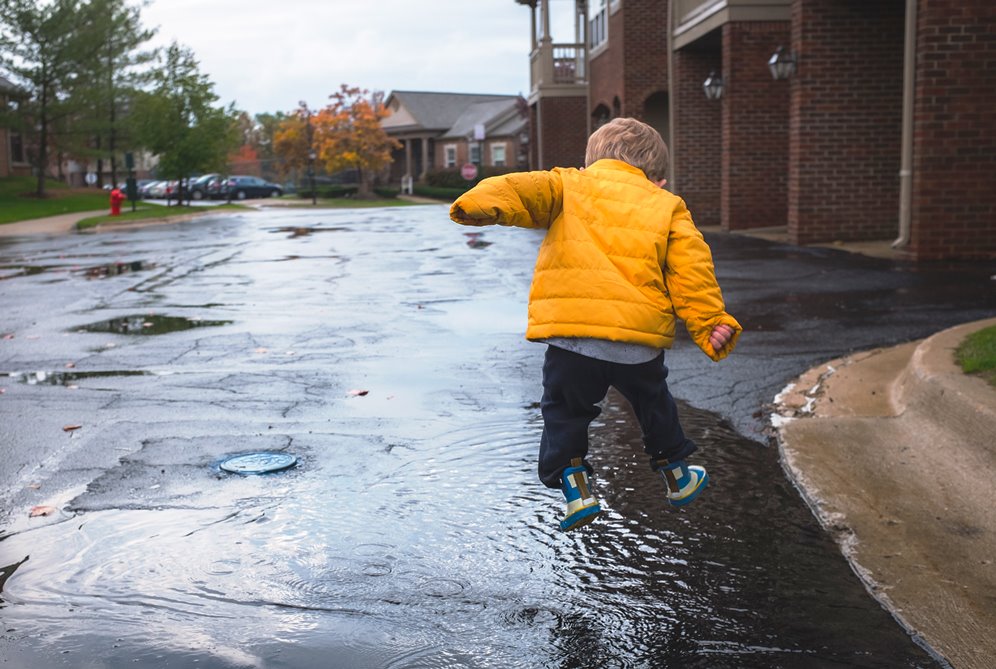“Achoo!!!” Every mom dreads this sound. The moment my little one sneezes, there are thousands of things that cross my mind. “Where would she have caught this infection?”, “Is she allergic to something?”, “Should I give her Allopathic medicines or home remedies”, “How should I build her immunity”, “Are all the precautions I take are not enough?” and so on and so forth. If you were reading all the above blabbering of my mind, did you read that immunity thing? “Ah! So you did.”
The immunity stuff is so important these days, especially when it is raining outside and you have nothing to do but think about immunity. Even in earlier days, immunity was quite important but the food and environment at the time of our parents and grandparents were starkly different with regards to the present time of our kids. Earlier, food was pure and fresh and pollution was almost zero. So, it is necessary that we make our kids strong and take precautionary measures instead of treating the ailment post it happens. This post is all about things that we should do and all those things that we should not do during rains that will help build the immunity of our kids.
What Food Helps Build Immunity During Monsoon?

Firstly, we shall discuss foods that we should give our kids all around the year. Foods that are rich in nutrients make the immune power of children quite strong. Here are some of them:
1. Citrus Foods
My little one is not fond of lemon. And I used to wonder what I should give to her that takes care of her Vitamin C requirement. Apart from lemon, fruits like sweet lime, oranges, and even grapefruit have sufficient amount of Vitamin C that takes care of your child’s immunity. You can also choose between broccoli, guava, papayas, bell peppers and tomatoes to up the intake of this micronutrient.
In order to boost the immune system, Vitamin C plays quite an important role. If your baby has Vitamin C enriched foods on a regular basis, the chances of catching viral or other infections reduce to a large extent. Further, Vitamin C helps in healing wounds at a faster rate as well. Now, some people have the notion that such things if given in rains will lead to cold in kids. However, to take care of this, mothers should always remember to give foods at room temperature to kids.
2. Yogurt
“Why did you give yogurt to your baby in this season? No wonders she has caught a cold” blurted my dear extra-concerned mommy. However, my fault was that I gave her refrigerated yogurt rather than the fresh one. Yogurt, in fact, is a probiotic food, brimming with microorganisms that fight infections and gut issues. The benefit of eating yogurt on a regular basis is that it builds the resistance power of the kids. And ultimately, all the monsoon ailments stay at bay. To enhance the flavor of yogurt, mommies can add fresh fruits or nuts as well. Avoid adding sugar to the yogurt. Make sure that the yogurt that you give to your children is fresh, unadulterated and without preservatives.
3. Variety of Veggies
I can understand that it is difficult to choose good vegetables in rainy season, with the fear of so many germs lurking around. However, if you properly and thoroughly wash the veggies, then you can gobble them up without any fear. The reason I am asking you to consume vegetables in monsoon is that they are the best shield against ailments during monsoon. Make sure that your diet is rich with green leafy vegetables, cruciferous vegetables, and bright colored veggies. Green leafy veggies are rich in folic acid and Vitamin C as well.
Your child should have them thrice a week. Cruciferous veggies flush out the toxins from the body and make the body strong. Examples of cruciferous veggies are broccoli and cauliflower. Your child should have these twice a week. Yellow and orange veggies are rich in beta-carotene and antioxidants to strengthen the immunity of the kids. Sweet potatoes, pumpkin, squashes, and carrots are bright colored veggies.
4. Grounded Spices
I like the sweet fragrances of cardamom and cinnamon during rains. It makes me feel homely. I make some fresh herbal tea adding these spices when it is pouring. The smell fills my home, making my family feel good. All of us at home love herbal teas. I make sure that my kiddo has at least half a cup of herbal tea during rains. This is because spices like peppercorns, cinnamon and cardamom are said to be immunity boosters. They prevent cold and flu and even treat them effectively. Black pepper is also said to relieve the symptoms of fever. Cinnamon, the humble spice, is an antibacterial, antifungal and antiviral as well. Add a tiny cinnamon stick to your daily meals or ground it and sprinkle the powder on preparations. Cinnamon powder enhances the flavor of baked goods as well.
5. Garden-fresh Herbs
There are so many herbs around us that we are not aware of. Many common herbs are said to boost the immune system of the kids. Holy basil is one of them. It is brimming with antibacterial and anti-fungal properties to ward off infections. It even treats cold and cough in kids effectively. Having holy basil at an empty stomach in the morning will boost the immunity power of the kids. Another herb that is very effective is Sage. With it antiseptic and anti-bacterial properties, sage help clear the mucus in the kids and treat their cold. For this, sage leaves can be added to hot water prepared for steam.
6. Mushrooms
They are not that beautiful that they can be cast in a movie, but they taste so good that their looks can easily be ignored. Yes, mushrooms are immunity boosters as well. They are brimming with Vitamin D and Zinc along with a host of natural antibiotics. Apparently, mushrooms fight several infections and keep ailments at bay. Mushrooms, when included in the diet, can even treat the symptoms of cold and flu. With so many types of mushrooms available, the most beneficial are shiitake, maitake, and reshi. You might be thinking about how to include mushrooms in the diet of kids. With mushrooms, you can prepare soups, stuff and bake them, add them to pizzas and pasta or just grill them and serve.
7. Garlic
While I am fond of it because of its taste, Garlic is known to boost immunity as well. It is both antibacterial and antiseptic. It is brimming with allicin and sulfides, which are good for immunity. Garlic is a must-have ingredient in your routine meals. For those who suffer from sinus, garlic can be termed as a blessing to them. This is because this humble vegetable can easily open up clogged sinuses. When included in meals, garlic automatically produces antibodies good for the health. Many people including my father-in-law relish raw garlic in salads. However, those who do not prefer the raw smell should cook the garlic before eating. For kids, hide this vegetable in soups and sauces.
8. Fresh Soup
Ah! Nothing can beat the joy of relishing some warm soup when it is raining outside. I am very fond of soup and have made sure that my toddler likes it too. With so many brands offering ready-to-drink soups, it is hard to ignore them. However, these are laden with preservatives. A better option is to prepare soup at home. The benefit of adding soup to your kids’ diet is that it keeps the body warm and wards off lurking infections during monsoon. You can prepare tomato soup, mixed vegetable soup, broccoli soup or even mushroom soup. Add a dollop of butter, a pinch of salt and freshly ground pepper to enhance the flavors of the soup. Soups have so many immunities boosting ingredients like veggies, pepper, garlic, ginger, etc. that it is a sin not to have them during rains. Soups also help treat cold as they are warm and easy to consume and digest. If prepared with the right proportion of ingredients, soups help keep the body hydrated and reduce bouts of inflammation.
9. Nuts
While I write this, I got the news of my friends’ daughter getting affected by the cold. Although she is not a picky eater, she desires to eat something different from the usual taste. In such situations, you can give nuts to the kids. Raw nuts or roasted ones taste quite good and are healthy as well. Prepare a trail mix with almonds, pistachios, and walnuts. You can even add seeds like pumpkin seeds, sunflower seeds, and flaxseeds. For kids with infections related to breathing, walnuts work best. Being rich in omega 3 fatty acids, walnuts can be added to meals in different ways or even relished raw.
10. Berries
Are you aware that berries are full of nutrients that help boost the immune system? Hence, it is necessary that both adults and kids include different types of berries in their meals. Berries are also brimming with antioxidants, Vitamin C and Vitamin A as well. It can be enjoyed in different ways – as fresh, dried berries, in muesli or breakfast cereals. Berries can also be used in baked goods and smoothies.
11. Ginger
The moment I hear ginger, my cravings for freshly baked ginger cookies intensifies. Ginger is so good in taste – strong and spicy at the same time. While some people add ginger to milk for their kids, others prefer giving it raw. Ginger can also be added to cakes, cookies, tea, vegetable curries, and lemon water or can be given with honey during seasonal changes. This versatile food is very helpful in soothing the itchiness of the throat and helps cure a cold and cough as it has both antibacterial and anti-viral properties.
12. Bitter Foods
Come rains, stock on bitter veggies for better protection. Bitter gourd, turmeric powder, fenugreek seeds and similar other foods are quite good for health. They help prevent infections and even improve health. Such foods also help in digesting food and improving the metabolism of the body.
13. Water
How can I forget the water! Most of my food-related posts have the mention of water, without fail. Water is an elixir and should be had irrespective of weather, health or age. During monsoon make sure your kid is hydrated all day long. However, you should make sure that the water is potable. Boil and cool down water before drinking.
Also Read: Learn the Right Way to Use Hula Hoops for Exercise and Burn Fat
What Not to Do During Rains

It is quite common to hear about things that can be done to steer clear from viral infections. However, you should also be aware of things that should not be done. Here are some of them:
1. Do not take viral infections lightly. If your kids’ friends are suffering from viral, start taking precautionary measures.
2. Do not get drenched in rain. Yes, rains are fun and kids will learn to enjoy simple pleasures of life. However, rains in cities are quite polluted. But you can allow occasional treats to your kids. Still, make sure that your kid takes a bath post-rain shower.
3. Do not eat food prepared by street vendors, however tempting it may seem. You never know the hygiene standards of such foods.
4. Do not keep the windows and doors open during monsoon. You might want the rain to come in but it will also bring mosquitoes and cold inside.
5. Do not forget to wash the hands with an antiseptic liquid. Also, use it to wash the clothes of the kids. Make sure you wash the fruits and vegetables as well thoroughly during rains.
6. Do not eat foods that are high in salt as it might lead to water retention in the body.
7. Do not opt for edible oils that are heavy, for instance, peanut oil, mustard oil, sesame oil, etc.
8. Do not consume vegetables like cluster beans, cauliflower, ladies finger, potatoes, kidney beans, pigeon pea, to avoid infection.
9. Do not eat foods that are high in water (muskmelon, watermelon, etc.) as it might lead to swelling in the body.
10. Do not drink too much tea and coffee as they dehydrate the body
11. Do not eat raw salads during monsoon. Instead opt for steamed salads, which are comparatively healthier.
12. Do not eat fish, meat and other similarly heavy foods during the monsoon.
And in the End…
No, this post is not meant to make monsoons dreadful for you. Instead take precautions beforehand so that you are hale and hearty all through the season. Let us make rains as beautiful as they used to be when we were kids. Happy monsoon!


